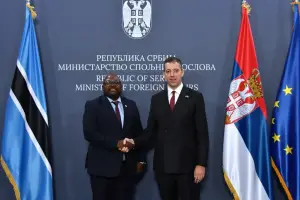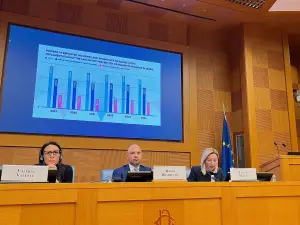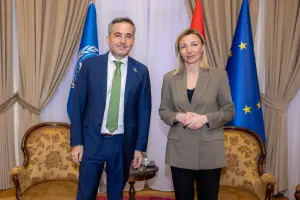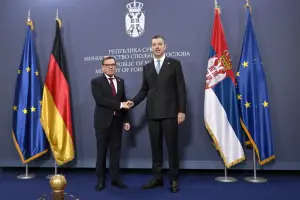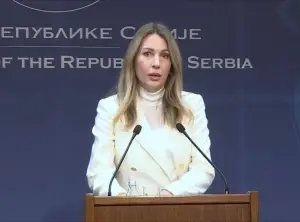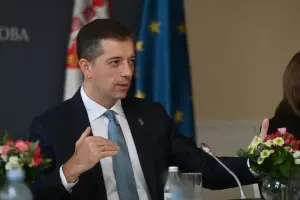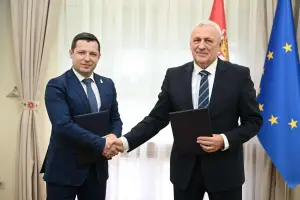Q:
A:
State will write-off debts of companies in difficult situation
Belgrade,
17 September 2004
Head of the Serbian government's Office of Media Relations Srdjan Djuric said today that the state will soon write off debts of companies that are currently in a difficult situation, in order to help them enter the privatisation process.
Speaking at a regular weekly meeting with reporters in the Serbian government, Djuric said that the privatisation of companies will be accelerated in autumn, in line with the existing legislation.
According to Djuric, all indicators in the first nine months of 2004 show that this year Serbia has experienced the largest economic growth in the past twenty years. That is good news, but much more has to be done so that we could live better, Djuric said.
Djuric said that in the next few days, the Contact Group will hold several meetings to discuss situation in Kosovo-Metohija. The first will be held early next week in New York.
Djuric confirmed that Serbian Prime Minister Vojislav Kostunica will have a telephone conversation with UNMIK chief Seren Jessen Petersen today. Djuric welcomed Petersen's statement that Serbian suggestions are welcome if they can help improve the plan of UNMIK and the government in Pristina on decentralisation of the province. This statement is a kind of international verification of the Serbian government's Plan for Kosovo.
The Serbian government rated as favourable yesterday's report by the US Department of State, especially the section referring to the respect of religious freedoms, which says that religious freedoms of Serbs and non-Albanians in Kosovo-Metohija are not respected enough, Djuric said.
The US Department of State thinks that much more has to be done on the protection of religious freedoms of Serbs and other religious groups in Kosovo-Metohija. They must have better living conditions and the freedom to practice their religion.
Djuric said that after next week's meeting of the Contact Group and the visit of European officials Chris Patten and Javier Solana to Belgrade scheduled for early October, it will be much clearer whether the Serbian government will call on Kosovo Serbs to go to the polls in the province. However, that decision cannot be made overnight, as there are still no institutional guarantees for Serbs. Djuric pointed out that after the March 17 violence, little has been done to improve security of Serbs, and that the international community has to demonstrate in practice that it wants the status of Serbs to be better.
Commenting on the statement of Kosovo Prime Minister Bajram Rexhepi that the dialogue between Pristina and Belgrade could start in October, Djuric said that the government feels that any dialogue is welcome, but that it will release its official position on the issue "when it receives the official request for taking part in the dialogue".
Djuric said that a Moscow delegation will pay an official visit to Belgrade from September 20 to 24. Moscow has set aside $2 million to assist construction of houses for Serbs in Kosovo-Metohija.
People from the Prime Minister’s Office will take part in this project as well as Commissioner for Refugees Dragisa Dabetic, Djuric said, stressing that the government is doing its job in detail and responsibly, particularly when the interest of Serbs in Kosovo-Metohija are concerned.
Djuric confirmed that intensive consultations with representatives of all parliamentary parties are underway, and that “we are on the good track to send the draft of the constitution to the parliament.” He also voiced hope that a consensus is reached so as to have the new constitution adopted.
Expressing hope that a new constitution will be adopted by the end of this year or in early 2005, he reiterated that the government came out with a proposal of the new constitution in early summer. He also said that Prime Minister Vojislav Kostunica on every occasion points out to the necessity of adopting a new constitution as soon as possible.
Speaking on the cooperation with the Hague tribunal, Djuric rejected allegations that October 1 is the deadline for Serbia to extradite Hague indictees, adding that “the only certain thing is that October 1 is an important date as it marks the end of September and the beginning of October.”
Djuric also said that a report made by an expert team on inter-ethnic relations in Serbia, particularly in Vojvodina, will be presented to the government, most likely next Thursday. He went on to explain that it will be the most widespread and detailed document dealing with such issues thus far. He also said that the document would be accessible to both the domestic and foreign public, and will be based on facts, not assumptions that could be heard on several occasions from many institutions, both Serbian and international.
As for the state union, Djuric said that Maastricht has clearly shown Europe’s stance towards Serbia-Montenegro, adding that all activities that began after Maastricht were intensified by the visit of EU high representatives Javier Solana and Chris Patten in Belgrade, which clearly speaks in favour of Serbia-Montenegro’s strengthening.
He also said that the conclusion of the meeting in Maastricht calls on the preservation of Serbia-Montenegro’s state union as one country within the EU.
“We think that the essence of all processes in Europe is integration, that interests of Serbia are equal to the interests of Europe, those are integrations,” Djuric said, adding that the government’s stance is that the decision on the “two-track lane” approach for the two republics’ economies is a good way to continue the integration process.
According to Djuric, all indicators in the first nine months of 2004 show that this year Serbia has experienced the largest economic growth in the past twenty years. That is good news, but much more has to be done so that we could live better, Djuric said.
Djuric said that in the next few days, the Contact Group will hold several meetings to discuss situation in Kosovo-Metohija. The first will be held early next week in New York.
Djuric confirmed that Serbian Prime Minister Vojislav Kostunica will have a telephone conversation with UNMIK chief Seren Jessen Petersen today. Djuric welcomed Petersen's statement that Serbian suggestions are welcome if they can help improve the plan of UNMIK and the government in Pristina on decentralisation of the province. This statement is a kind of international verification of the Serbian government's Plan for Kosovo.
The Serbian government rated as favourable yesterday's report by the US Department of State, especially the section referring to the respect of religious freedoms, which says that religious freedoms of Serbs and non-Albanians in Kosovo-Metohija are not respected enough, Djuric said.
The US Department of State thinks that much more has to be done on the protection of religious freedoms of Serbs and other religious groups in Kosovo-Metohija. They must have better living conditions and the freedom to practice their religion.
Djuric said that after next week's meeting of the Contact Group and the visit of European officials Chris Patten and Javier Solana to Belgrade scheduled for early October, it will be much clearer whether the Serbian government will call on Kosovo Serbs to go to the polls in the province. However, that decision cannot be made overnight, as there are still no institutional guarantees for Serbs. Djuric pointed out that after the March 17 violence, little has been done to improve security of Serbs, and that the international community has to demonstrate in practice that it wants the status of Serbs to be better.
Commenting on the statement of Kosovo Prime Minister Bajram Rexhepi that the dialogue between Pristina and Belgrade could start in October, Djuric said that the government feels that any dialogue is welcome, but that it will release its official position on the issue "when it receives the official request for taking part in the dialogue".
Djuric said that a Moscow delegation will pay an official visit to Belgrade from September 20 to 24. Moscow has set aside $2 million to assist construction of houses for Serbs in Kosovo-Metohija.
People from the Prime Minister’s Office will take part in this project as well as Commissioner for Refugees Dragisa Dabetic, Djuric said, stressing that the government is doing its job in detail and responsibly, particularly when the interest of Serbs in Kosovo-Metohija are concerned.
Djuric confirmed that intensive consultations with representatives of all parliamentary parties are underway, and that “we are on the good track to send the draft of the constitution to the parliament.” He also voiced hope that a consensus is reached so as to have the new constitution adopted.
Expressing hope that a new constitution will be adopted by the end of this year or in early 2005, he reiterated that the government came out with a proposal of the new constitution in early summer. He also said that Prime Minister Vojislav Kostunica on every occasion points out to the necessity of adopting a new constitution as soon as possible.
Speaking on the cooperation with the Hague tribunal, Djuric rejected allegations that October 1 is the deadline for Serbia to extradite Hague indictees, adding that “the only certain thing is that October 1 is an important date as it marks the end of September and the beginning of October.”
Djuric also said that a report made by an expert team on inter-ethnic relations in Serbia, particularly in Vojvodina, will be presented to the government, most likely next Thursday. He went on to explain that it will be the most widespread and detailed document dealing with such issues thus far. He also said that the document would be accessible to both the domestic and foreign public, and will be based on facts, not assumptions that could be heard on several occasions from many institutions, both Serbian and international.
As for the state union, Djuric said that Maastricht has clearly shown Europe’s stance towards Serbia-Montenegro, adding that all activities that began after Maastricht were intensified by the visit of EU high representatives Javier Solana and Chris Patten in Belgrade, which clearly speaks in favour of Serbia-Montenegro’s strengthening.
He also said that the conclusion of the meeting in Maastricht calls on the preservation of Serbia-Montenegro’s state union as one country within the EU.
“We think that the essence of all processes in Europe is integration, that interests of Serbia are equal to the interests of Europe, those are integrations,” Djuric said, adding that the government’s stance is that the decision on the “two-track lane” approach for the two republics’ economies is a good way to continue the integration process.



